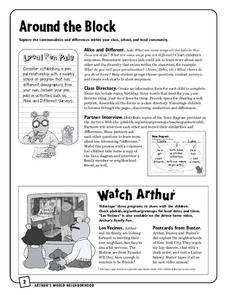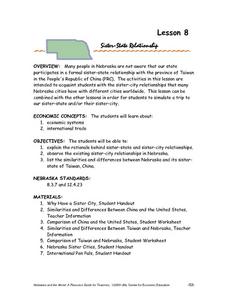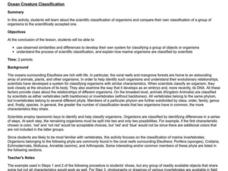Curated OER
The Incredible Edible Rocks
Students study the three different types of rocks and view examples of each. Then in small groups they observe three treats and compare them to the three types of rocks. The results are placed on a Venn diagram to show the similarities...
Curated OER
What Would Pink Say
Students create Venn diagrams of similarities and differences between two main characters in Pink and Say by Patricia Polacco.
Curated OER
Animal Forms
Learners demonstrate similarities and differences in animal forms, including humans.They investigate geometric relationships within those forms by building an animal using Zome System elements.
Curated OER
Cinderella: A Story Found in Many Cultures
First graders explore, discuss and examine fairy-tale and make-believe stories. They assess two different types of Cinderella stories to surface a broader look at cultural diversity. Students construct a Venn Diagram or a chart of the...
Curated OER
A Day in the Life of a Child in Accra, Ghana
Students create a list of similarities and differences between their lives and the life of a child in Ghana. They write what a typical day would be like if they lived in Ghana.
PBS
Around the Block
Arthur and his friends help children explore the concepts of family, community, and diversity in a fun series of activities. From performing peer interviews to mapping out the different places students have lived or visited, this...
Curated OER
A Moroccan Fairy Tale vs. European Folk/Fairy Tale
Second graders describe similarities and differences between The Girl Who Lived with the Gazelles, an African folk tale from Morocco, and Snow White and the Seven Dwarves on a class chart.
Curated OER
Classify UT Plants and Animals
Students practice using 2 different plant classification keys to identify species. They make choices between the similarities and differences between their object and the classification scheme.
Curated OER
Creation Mythology
Students construct a map from geographic data and explain relationships found in the information. Students identify ancient beliefs and customs through Hawaiian creation myths while comparing similarities and differences and appreciating...
Curated OER
Group Dynamics
Middle schoolers define the purpose of different groups. Using photographs, they practice identifying the group affiliation to one another and describe their characteristics in the picture. They discover the similarities and differences...
Curated OER
Copycat
Fifth graders work in groups with information sheets about Monarch and Viceroy Butterflies.They create a Venn diagram to illustrate the differences and similarities between these two butterfly types. Students discuss the importance of...
Curated OER
Air Masses
Learners are given maps depicting two or more air masses and they then categorize bodies of air by temperature and moisture characteristics. They recognize large regions of similar type air. Students are given a map of air temperatures...
Curated OER
Diaries From the Holocaust
Sixth graders find similarities and differences in two different diary entries. In this Holocaust history meets literary skills lesson plan, 6th graders read the diary of a soldier or prisoner from the the Auschwitz concentration camp...
Curated OER
Sister-State Relationship
Young scholars examine the rationale behind sister-state and sister-city relationships and observe the existing sister-city relationships in Nebraska. They list similarities and differences between Nebraska and its sister-state of...
Curated OER
Pearl Harbor vs September 11 Attack
Learners compare and contrast the events of the Pearl Harbor Attack and the attack on September 11, 2001 by examining the similarities and differences between these two events.
Curated OER
COMPARING BUDDHISM AND CONFUCIANISM
Learners conduct research into the two largest religions of Asia that are Buddhism and Confucianism. They set out to find the similarities and differences with the help of a graphic organizer.
Curated OER
Plant Identification Pictionary
Students participate in a plant identification game. Using worksheets, they collect plant samples and identify the basic parts of the plant. They note the similarities and differences between the various diagrams. They use heavy books...
Hawaiʻi State Department of Education
Comparing Cultural Dances
All cultures express similar thoughts, feelings, and ideas. But, often times those things are expressed differently. Learners compare and contrast traditional dances from two cultures. They watch videos of each performance, stop to...
Curated OER
Reading a Comparison-Contrast Essay
Turn your passive readers into active readers with an engaging lesson on reading informational text. Focused on compare and contrast structured essays, the activity prompts elementary learners to jot down questions and think-aloud...
Roy Rosenzweig Center for History and New Media
Founding Documents
Teach the class about the predecessor to Declaration of Independence—the Virginia Declaration of Rights. Using the foundational documents, scholars examine the two writings to consider how they are similar and how they are different. A...
CK-12 Foundation
Frequency Polygons: Constructing a Frequency Polygon
Connect the dots on frequency. Given a distribution table of scores on an assessment, learners create a frequency polygon by moving points on a graph to the correct frequency. The pupils use the display to answer questions about the...
Curated OER
Ocean Creature Classification
Students develop their own system for classifying a group of objects or organisms using observed similarities and differences. They investigate the process of scientific classification, and explain how marine organisms are classified by...
Curated OER
Ready, Set, Tech
Learners oabsrve pictures of a Brachiosaurus and an Apotosaurus. They discuss how features are similar, and different. Students list data in a Venn diagram. They visit book mark websites. Learners write three facts on how to saurpods...
CK-12 Foundation
Counting Events: Flipping Unfair Coins
Who said life was fair? An interactive uses an area diagram to represent the probabilities of flipping unfair coins. Pupils use the diagram to calculate the probabilities of outcomes of flipping the two coins. The scholars must decide...























